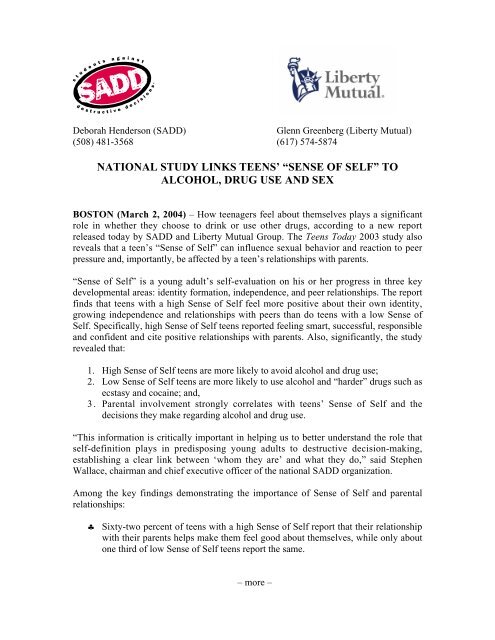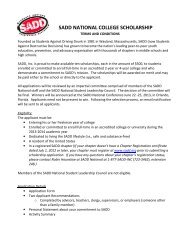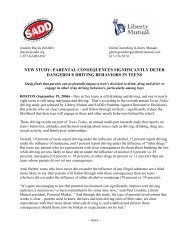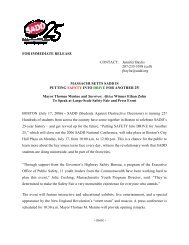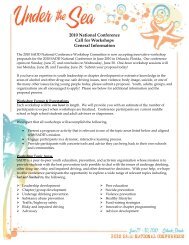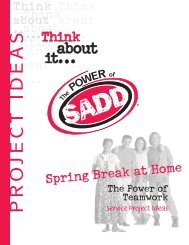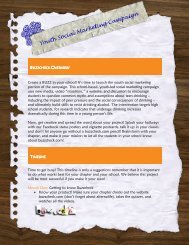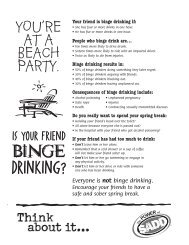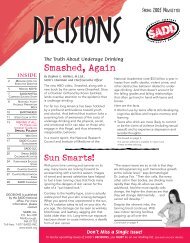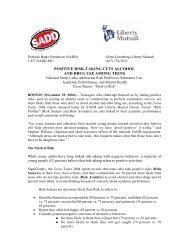Download printable pdf version - SADD
Download printable pdf version - SADD
Download printable pdf version - SADD
You also want an ePaper? Increase the reach of your titles
YUMPU automatically turns print PDFs into web optimized ePapers that Google loves.
Deborah Henderson (<strong>SADD</strong>)<br />
Glenn Greenberg (Liberty Mutual)<br />
(508) 481-3568 (617) 574-5874<br />
NATIONAL STUDY LINKS TEENS’ “SENSE OF SELF” TO<br />
ALCOHOL, DRUG USE AND SEX<br />
BOSTON (March 2, 2004) – How teenagers feel about themselves plays a significant<br />
role in whether they choose to drink or use other drugs, according to a new report<br />
released today by <strong>SADD</strong> and Liberty Mutual Group. The Teens Today 2003 study also<br />
reveals that a teen’s “Sense of Self” can influence sexual behavior and reaction to peer<br />
pressure and, importantly, be affected by a teen’s relationships with parents.<br />
“Sense of Self” is a young adult’s self-evaluation on his or her progress in three key<br />
developmental areas: identity formation, independence, and peer relationships. The report<br />
finds that teens with a high Sense of Self feel more positive about their own identity,<br />
growing independence and relationships with peers than do teens with a low Sense of<br />
Self. Specifically, high Sense of Self teens reported feeling smart, successful, responsible<br />
and confident and cite positive relationships with parents. Also, significantly, the study<br />
revealed that:<br />
1. High Sense of Self teens are more likely to avoid alcohol and drug use;<br />
2. Low Sense of Self teens are more likely to use alcohol and “harder” drugs such as<br />
ecstasy and cocaine; and,<br />
3. Parental involvement strongly correlates with teens’ Sense of Self and the<br />
decisions they make regarding alcohol and drug use.<br />
“This information is critically important in helping us to better understand the role that<br />
self-definition plays in predisposing young adults to destructive decision-making,<br />
establishing a clear link between ‘whom they are’ and what they do,” said Stephen<br />
Wallace, chairman and chief executive officer of the national <strong>SADD</strong> organization.<br />
Among the key findings demonstrating the importance of Sense of Self and parental<br />
relationships:<br />
♣ Sixty-two percent of teens with a high Sense of Self report that their relationship<br />
with their parents helps make them feel good about themselves, while only about<br />
one third of low Sense of Self teens report the same.<br />
– more –
2003 Teens Today – 2<br />
♣ Only 30 percent of high school teens whose parents provide a strong level of<br />
guidance have used drugs, compared to 48 percent of high school teens whose<br />
parents do not provide strong guidance.<br />
♣ Less than half (47 percent) of high school teens whose parents provide a strong<br />
level of guidance have used alcohol, compared to 80 percent of high school teens<br />
whose parents do not provide strong guidance.<br />
♣ Teens with a high Sense of Self report overwhelmingly that they feel respected by<br />
their parents (93 percent) and close to their parents (85 percent), while teens with<br />
a low Sense of Self report lower levels of respect from their parents (8 percent)<br />
and closeness to their parents (12 percent).<br />
♣ Nearly two thirds (64 percent) of teens believe it is very likely they will lose their<br />
parents’ trust if caught drinking alcohol; two thirds (67 percent) report the same<br />
with respect to drug use.<br />
What Does This Mean for Families?<br />
These findings are consistent with past Teens Today studies that have shown that teens<br />
who report regular, open communication with their parents about important issues say<br />
they are more likely to try to live up to their parents’ expectations and less likely to drink,<br />
use drugs or engage in early sexual behavior.<br />
Paul Condrin, Liberty Mutual executive vice president, Personal Market, said, “We know<br />
that parents who cultivate a family environment that includes positive, open channels of<br />
communication with their children are much more successful at influencing their children<br />
to avoid engaging in dangerous behaviors. Now we know that helping to develop a young<br />
person’s positive Sense of Self can go to great lengths at improving the odds that the<br />
child will avoid alcohol and drug use.”<br />
Importantly, Teens Today 2003 points to important steps parents can take to positively<br />
enhance their teens’ Sense of Self.<br />
• Support a wide sampling of interests, activities, and age-appropriate behaviors.<br />
• Encourage separation from parents and age-appropriate independence in decisionmaking.<br />
• Teach peer-to-peer social skills and facilitate (positive) peer relationships.<br />
– more –
2003 Teens Today – 3<br />
A teen’s Sense of Self also relates directly to mental health and relationships with peers.<br />
For example, teens with a low Sense of Self are more likely than teens with a high Sense<br />
of Self to report regular feelings of stress and depression, weaker relationships with<br />
parents, and greater susceptibility to peer pressure. Other key findings from the research:<br />
• Teens who regularly feel stress or depression are much less inclined than other<br />
teens to avoid high-risk behaviors such as drinking, using drugs or engaging in<br />
early sexual activity.<br />
• Teens who avoid drinking and drug use are more likely to have a favorable selfimage.<br />
• Regular feelings of stress and depression tend to be more common among<br />
sexually active teens than among their non-sexually active peers.<br />
• High Sense of Self teens are more resistant to pressure from peers to drink, use<br />
drugs, or have sex.<br />
Methodology<br />
Teens Today 2003 reports on the completion of a total of 2,753 self-administered surveys<br />
by middle and high school students in grades 6-12. RoperASW designed the Teens Today<br />
2003 study and administered it in a nationwide cross-section of 46 schools (25 middle<br />
schools, 21 high schools) between May 6 and June 18, 2003. The sampling error for the<br />
study at the 95 percent confidence level is +/- 3 percentage points for the total sample.<br />
Additional findings from qualitative research (focus groups and individual interviews),<br />
designed and conducted by Atlantic Research and Consulting, Inc. in April 2003, were<br />
used in the development of the student survey.<br />
Teens rated themselves according to characteristics tied to the adolescent developmental<br />
tasks of Identity, Independence, and Peer Relations. A composite profile rating each<br />
participant as high, medium or low Sense of Self was developed and then correlated to<br />
three psychographic profiles, or “decision-types,” identified in earlier Teens Today<br />
research: Avoiders (teens who tend to avoid alcohol and other drug use), Experimenters<br />
(teens who occasionally experiment with alcohol and other drug use), and Repeaters<br />
(teens who regularly engage in alcohol and other drug use).<br />
Sense of Self scores were also correlated with the Teens Today decision factors of Mental<br />
States (e.g. boredom, depression), Personal Goals (e.g. to feel grown up, to fit in),<br />
Potential Outcomes (e.g. impact on academic/athletic performance, chances of getting<br />
caught), and Significant People (e.g. parents, peers).<br />
– more –
2003 Teens Today – 4<br />
<strong>SADD</strong> and Liberty Mutual Group<br />
<strong>SADD</strong>, Inc. (Students Against Destructive Decisions/Students Against Driving Drunk)<br />
sponsors peer-to-peer education and prevention programs in middle schools and high<br />
schools nationwide.<br />
Liberty Mutual Group is one of the largest multi-line insurers in the property and<br />
casualty industry. Offering a wide range of products and services, including private<br />
passenger auto and homeowners insurance, Liberty Mutual Group employs 37,000 people<br />
in more than 900 offices throughout the world.<br />
<strong>SADD</strong> and Liberty Mutual make available a number of important family communication<br />
tools:<br />
• <strong>SADD</strong>’s Contract for Life and “Opening Lifesaving Lines” brochure<br />
• <strong>SADD</strong>’s Family Focus speakers program<br />
• Liberty Mutual’s “Avoiding Collisions: How to Survive the Teenage Driving<br />
Years” video and brochure<br />
• <strong>SADD</strong>/Liberty Mutual “Guidelines for Good Family Communication”<br />
brochure<br />
For more information or to receive materials, contact:<br />
<strong>SADD</strong>, Inc., 1-877-<strong>SADD</strong>-INC, www.sadd.org<br />
Liberty Mutual Group, 1-800-4-LIBERTY, www.libertymutualinsurance.com
2003 Teens Today – 5<br />
Addendum: Other Key Findings<br />
Drinking<br />
⎫<br />
⎫<br />
⎫<br />
⎫<br />
⎫<br />
Teens’ involvement with alcohol increases steadily as they mature.<br />
Younger teens are more likely than older teens to drink because of peer pressure.<br />
Older teens are more likely than younger teens to drink to escape problems.<br />
High Sense of Self teens are particularly resistant to peer pressure to drink.<br />
Teens who are alcohol Repeaters and Experimenters are much more likely than teens who are<br />
alcohol Avoiders to have immediate family members who drink a lot.<br />
Drug Use<br />
⎫<br />
⎫<br />
⎫<br />
⎫<br />
⎫<br />
⎫<br />
The most commonly used drug among teens is marijuana.<br />
Younger teens are more likely than older teens to use drugs to feel grown up.<br />
Older teens are more likely than younger teens to use drugs because of stress.<br />
High Sense of Self teens are considerably less likely than other teens to be susceptible to peer<br />
pressure to use drugs.<br />
Low Sense of Self teens are more likely than are high Sense of Self teens to use drugs to<br />
escape from or forget about problems.<br />
Low Sense of Self teens are more likely to have friends who use drugs.<br />
Sex<br />
⎫<br />
⎫<br />
⎫<br />
⎫<br />
⎫<br />
⎫<br />
⎫<br />
About half of teens have engaged in some sexual activity other than kissing.<br />
Teens’ motivations for having sex do not vary widely by age.<br />
The most common reasons for teens to have sex are to strengthen the relationship with a<br />
partner and to have fun.<br />
High Sense of Self teens are more resistant to peer pressure when it comes to decisions about<br />
sex and are more likely to refuse an offer to have sex.<br />
Low Sense of Self teens are more likely than high Sense of Self teens to cite boredom and<br />
depression as reasons to have sex.<br />
Low Sense of Self teens are more likely than high Sense of Self teens to associate sex with<br />
negative emotional outcomes such as depression or loss of self-respect.<br />
Girls are more likely than boys to link sex with loss of self-respect and depression.<br />
Drinking and Drugs<br />
⎫<br />
⎫<br />
⎫<br />
⎫<br />
Teens who avoid drinking and drugs are more likely to have a favorable self-image.<br />
One of the most common reasons to avoid drinking or using drugs is to please parents.<br />
Low Sense of Self teens are more likely to feel strongly that it is okay to drive after drinking<br />
or using drugs.<br />
Drug and alcohol Repeaters are particularly likely to have friends who drink or use drugs a<br />
lot.
2003 Teens Today – 6<br />
Drinking, Drugs, Sex and Driving<br />
⎫<br />
⎫<br />
Teens who choose to avoid potentially destructive behaviors are considerably more inclined<br />
than those who do not to view drinking, drugs and sex as very harmful for someone their age.<br />
Substance Avoiders are more likely to associate specific negative outcomes, such as loss of<br />
parent trust, increase risk of auto accidents, chance of risky sexual behaviors and increased<br />
risk of poor academic performance, with drinking.<br />
Parents and Teens<br />
⎫ The quality of parent-teen relationships is likely to play a critical role in determining teens’<br />
mood and, thus, their susceptibility to destructive decision-making.<br />
⎫ Teens whose parents set guidelines for their behaviors are more inclined to feel positively<br />
about themselves and to avoid drinking and using drugs.<br />
⎫ High Sense of Self teens are more likely than other teens to communicate openly and<br />
honestly with their parents and to describe themselves as close to their parents.<br />
⎫ Low Sense of Self teens are particularly likely to feel that they spend an insufficient amount<br />
of time with their parents.<br />
⎫ Younger teens are significantly more likely than are older teens to say that their relationship<br />
with their parents makes them feel very good about themselves.<br />
⎫ Teens who avoid drinking and drugs are more likely to have positive relationships with<br />
parents.<br />
# # #


